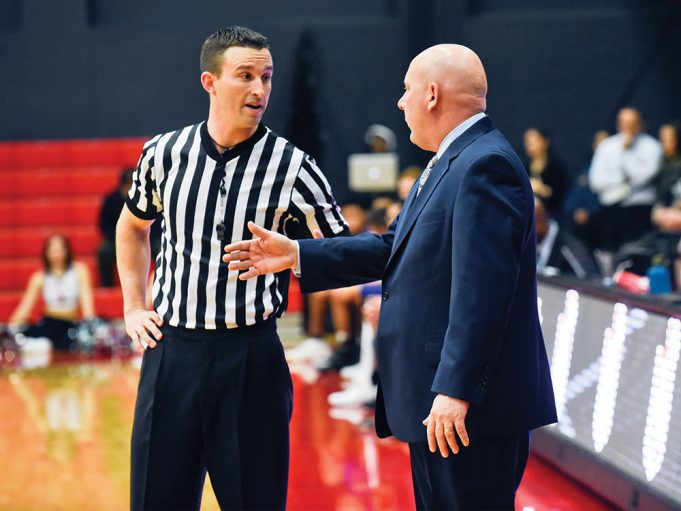Officiating is an interesting and challenging line of work, no matter your involvement. Whether you are an active official, assigner or administrator, decisions you make and the things you do are under constant scrutiny today more than ever.
All officials think about calling the best game of their careers, about getting the call to work a state tournament or about moving to the next level. What we do not think about enough is the more difficult and trying side of officiating — what do we do and how do we move on when those things do not happen?
It could be you who remains at the middle school level. No matter how hard you work or how much you study, you are not finding it easy to master your craft. You begin to wonder if the avocation is for you. You try your best to advance and improve your schedule, but you plateau before you thought you would. You hear the talk of officials who have the “it” factor, but you realize that you may not have “it” and you may not be “it.”
It could be you who does not get the call to go to state, even though you feel in your heart of hearts that you deserve the nod. You see the other officials who were selected and wonder, “Why them?” and “Why not me?” You feel like you have exceeded the expectations and standards of your association. You painstakingly watch the games and cheer on your officiating colleagues, with the hope that next year, you will be working and they will be cheering for you.
It could be you who gets the call to work the tournament and during the course of the tournament, you make dozens of quality calls. You are consistently in position, your mechanics are flawless and you are rated among the best in the tournament — until suddenly, you are not. In a split second, your tournament and your season end. You wonder how you move on from that disappointment, knowing that it cannot define you, as you try to focus on the next play, the next game and the next season.
It could be you as the assigner or the administrator who has to make the decisions to put officials at different levels. You have to decide whose body of work has earned them a state tournament selection, to decide who advances and who goes home. The decisions have to be in line with your process, putting away your knowledge of an official’s previous performances or overall officiating resume. You have to uphold the integrity of the system.
In each of those scenarios, we go through all of the stages of grieving — denial, anger, bargaining, depression and acceptance. Sometimes, we have an entire offseason to go through the stages. Often, we only have until the next game. How we manage those very real stages in our avocation is crucial, not only in our individual roles, but as an association as a whole and for the growth of the association.
For every 20 correct calls, we may miss one or two
What we do is difficult. For every 100 successes, we have one failure. For every 20 correct calls, we miss one. For every celebration of a great call or a great game, we have one that breaks our hearts. We have to turn miscues into learning situations for others. We have to do what is best for our association as a whole. We have to train our officials and our leaders how to “reset” and turn a low into a high.
As an officiating family, we must rise and fall together. When one official is hurting, the rest of the family feels that pain. When one official celebrates, everyone else feels that happiness. Through the best of times and the worst of times, we lift each other up when we are down and we share the smiles and laughter when the times are good.
It could be you that uses a failure as a beacon to the next group of officials that follows you, who helps another official through a difficult time or uses your moment to effect change and become a catalyst for growth and improvement.
In the words of Greek philosopher Epictetus, “It’s not what happens to you, but how you react that matters.” It could be your reaction that spurs a positive change for everyone around you. One moment, one call, one decision does not define you or career, but how you react and respond after the fact always will.
What's Your Call? Leave a Comment:
Note: This article is archival in nature. Rules, interpretations, mechanics, philosophies and other information may or may not be correct for the current year.
This article is the copyright of ©Referee Enterprises, Inc., and may not be republished in whole or in part online, in print or in any capacity without expressed written permission from Referee. The article is made available for educational use by individuals.


















